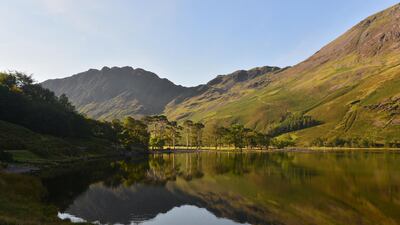A few days ago, as I was looking across a particularly verdant landscape, my mind turned to a recent conversation with a friend in Abu Dhabi on the impact of the environment on wellbeing, or, to put it another way, how our surroundings affect the way that we feel.
I have been following with interest a series of posts on social media by a British journalist who has been struggling with mental health issues. Rather bravely, in my view, she has been chronicling her ups-and-downs and the way in which her spirits are lifted by swimming in rivers amid the gorgeous landscape of England’s Lake District or by the discovery of a fragile, beautiful rare orchid.
It’s clear that being surrounded by and engaging with natural beauty is of enormous importance to her. On a different level, I recall how my spirits lift when I drive across the border between England to Scotland on my way to a much-loved valley in the Scottish Borders, which I have visited many times over the last few decades. It just feels good, even if it’s raining, which is often the case. The same applies when I wander around a favourite wadi in Fujairah, whether in summer or winter.
It might be the case that I feel a particular affinity with the natural beauty of the countryside, wherever it may be, because I’m a country boy at heart. I spent my childhood in a house surrounded by a large garden, with woods and fields beyond and with a view for miles across a rolling landscape.
That doesn't mean that I cannot find a similar enjoyment, an identical lifting of the spirit, in an urban environment. It can happen, too, if I am sitting in a well-wooded square in the heart of London or strolling across one of the public parks to be found throughout the city of Abu Dhabi. Even if there's nothing special to be seen in terms of wildlife – and often there is nothing – the very fact of "communing with nature" has a benefit in itself.
I don't think I am unusual in this, although I know there are people who find open spaces hold particular challenges for them. Perhaps that's why, even in the midst of some of the most deprived urban communities in the world, one can see ways in which people seek nature, however that is defined. Tiny plots of land with carefully tended flowers, even a plant in a pot on a balcony or in a cluttered room, or on an office desk, also suggest there's something of benefit to be obtained with a relationship – however small, however tenuous – with the wider world.
Even in school, there is, I would argue, a benefit to be gained from observing the growth of plants and seeds and in a way which allows children to participate. I am delighted that my own daughter's school is introducing such a programme at the beginning of the next academic year. It might not offer them perspectives of lofty mountaintops, an archipelago of tiny islands or the babble of a mountain stream but it will, I hope, introduce them to some of the fascinations of the natural world and teach them to observe their surroundings in a different way.
It’s easy for social scientists and for governments to take a view of society and its needs that places a focus on issues such as physical health, employment, security, interpersonal relationships and access to sufficient water and food. These are all, of course, of enormous importance, fundamental elements in the health of any community. We all need that, whether rich, poor or somewhere in-between.
Perhaps, though, there’s a need to pay greater attention to our surroundings and the nature itself found within them. It might be difficult to define, in sociological terms, the impact that the natural world can have upon us, not least because it might vary from individual to individual.
However one seeks to define the concept of happiness – rightly identified as one of the targets to which the United Arab Emirates aspires – I would hope that the intangible benefit gained from the role the natural world can play in our physical environment receives the attention it rightly deserves.
Peter Hellyer is a consultant specialising in the UAE’s history and culture


